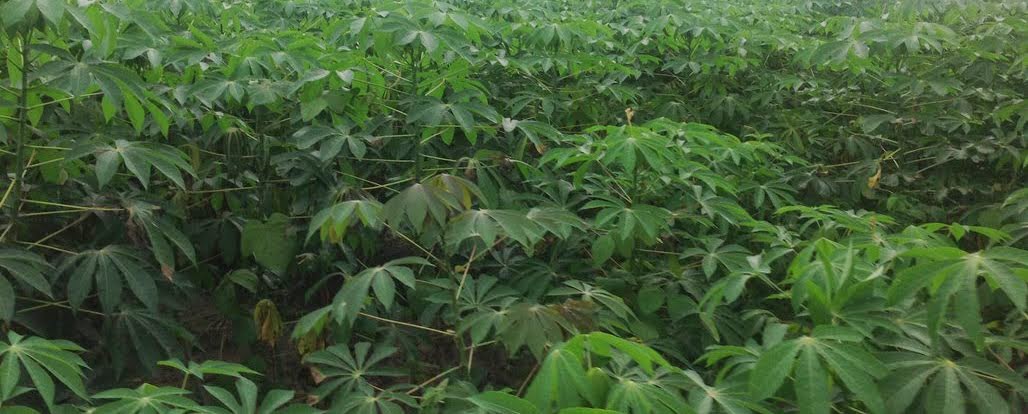…
As researchers want action stepped up against weeds
Rising from a two-day
meeting at the International Institute of Tropical Agriculture Ibadan,
researchers have commended the Director General of IITA, Dr Nteranya Sanginga
for rejuvenating the weeds science program. They also called for more concerted
efforts to tackle the menace of weeds in Africa.
The researchers, who are
members of the Steering Committee of the IITA Cassava Weed Management project,
were unanimous during their inception meeting that unless the problem of weed
infestation on farmers’ field is addressed, Africa will not maximize the gains
of crop improvement.
 |
| Researchers gather to during the Steering Committee meeting of the IITA Cassava Weed Management project in Ibadan |
The meeting, which was held
18- 19 August 2014, gave kudos to IITA for its new research agenda of investing
in weed science and bringing weed science—a very important but often neglected
component of agronomy— to the front burner, and for supporting partners in
tackling the problem.
“We thank IITA for the
equipment given to us under the Cassava Weed Management Project to help find
solutions to the problems of weeds,” said Dr J.C. Okonkwo, Executive Director,
National Root Crops Research Institute (NRCRI), Umudike, who was also
unanimously elected as the Chair of the Steering Committee.
Under the new research
focus, IITA committed to revive its weed management research; rehabilitated an
office building, procured equipment, and hired staff. The building was
commissioned during the Steering Committee meeting by Deputy Director General
(Partnerships & Capacity Development), Dr Kenton Dashiell, who dedicated it
to resource-poor farmers, especially women and children.
Prof John Adisa Ayoade,
Deputy Vice Chancellor, University of Agriculture Makurdi (UAM) commended IITA
for investing in weed science and called on other institutions to emulate.
The Deputy Vice Chancellor
who represented the Vice Chancellor of UAM specifically urged the IITA Cassava
Weed Management Project to include graduate students to develop the critical
human capital that would take research on weed science forward considering the
fact that current weed scientists in Africa were aging.
Commending IITA for its
renewed attention to weed science, Project Leader, Cassava Weed Management, Dr
Alfred Dixon reiterated the project’s goal of increasing cassava productivity
for at least 125,000 Nigerian farm families through the provision of
labor-saving solutions for cassava weeding which is usually done by women and
children.
 |
| Dr Kenton Dashiell (center) inaugurating the IITA Weed Science Center |
He said IITA and its
partners would work to develop state-of the art weed management practices, by
combining improved cassava varieties with proper planting dates, plant
populations and plant nutrition options.
According to him, the project is also focusing on intercropping and
tillage research, as well as testing 21 different pre-emergence and 19
post-emergence herbicides at different application rates to discover the best
combinations for sustainable weed control in cassava. Dr Dixon explained that
integrated weed management practices, including the use of herbicides that meet
globally accepted conventions and safety thresholds appropriate for
smallholders would be crucial in making weed control in cassava more efficient
and effective.
The Project Leader decried
farmers’ continuous use of obsolete herbicides despite their adverse effects on
the environment and health. He said the project intended to change the
situation by offering farmers evidence-based information that would help them
make better choices.
The project’s progress
report presented by the Principal Investigator of the Project, Professor Friday
Ekeleme excited members of the Steering Committee. Consequently, they suggested
new areas the project could explore for better performance and also developed a
monitoring and evaluation guide for the project.
The Steering Committee
comprise experts from the three collaborating institutions— the National Root
Crops Research Institute (NRCRI), Umudike; University of Agriculture Makurdi;
and Federal University of Agriculture Abeokuta. Other members include
international cassava scientists, and representatives of the donor community,
Federal Ministry of Agriculture and Rural Development, Nigeria, and the private
sector.
The committee also visited
the IITA Business Incubation Platform and made field trips to experimental
plots on cassava weed management control at IITA Campus and Moniya in Ibadan,
Oyo State and Ile-ogbo in Osun state.
 |
| Researchers gather to during the Steering Committee meeting of the IITA Cassava Weed Management project in Ibadan |

%2B(Copy).jpg)
1.jpg)